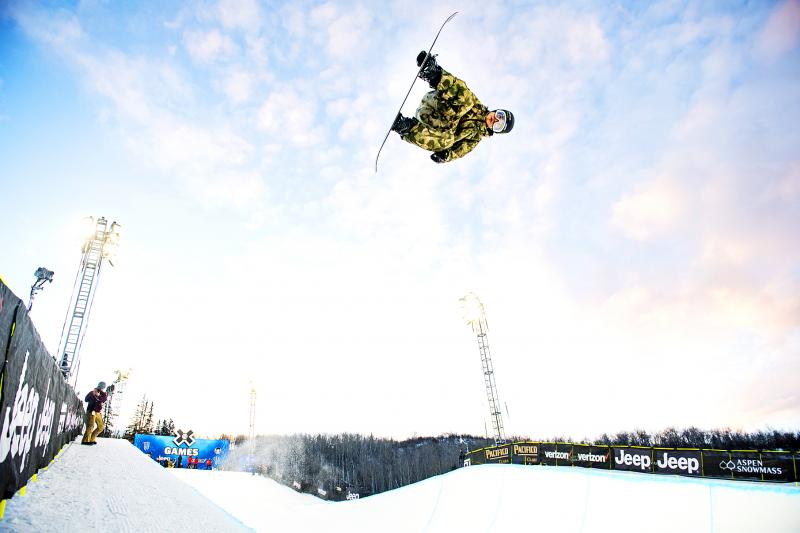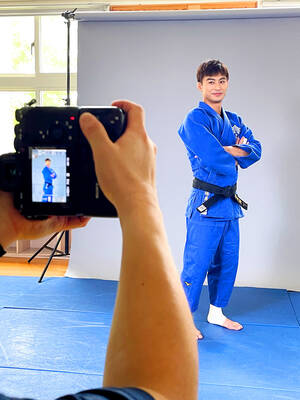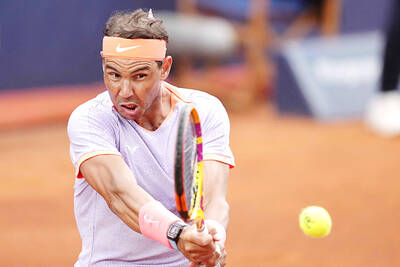With Winter X Games medals in one hand and their snowboards in the other, the Hirano brothers — Ayumu and Kaishu — posed for photograph after photograph at the bottom of the half-pipe.
Get used to it. They could be on the podium again at the Beijing Olympics, and it would be no surprise to see the entire Japanese team go gold, silver, bronze and maybe even scoop up fourth place, too.
“The Japanese are a force,” said Australia’s Scotty James, who took gold at Winter X over the weekend and, along with Shaun White, is among the handful of male riders standing in the way of Japan’s growing dominance.

Photo: AP
“Just incredibly talented snowboarders,” James said.
They are tight-knit, too. They might be fierce rivals on competition days, but they stay good friends in between. They travel together, eat together and perfect innovative tricks together. They have certainly raised the bar in the half-pipe, along with expectations.
Long filled with potential, they only have Ayumu Hirano’s two silver medals and Taku Hiraoka’s bronze to show for it since snowboarding arrived on the Olympic scene in 1998.
Yet this crew of Japanese riders appears poised to take over the half-pipe in Beijing with four bona fide gold-medal contenders in the Hirano brothers — Kaishu is nearly four years younger than Ayumu — along with Ruka Hirano and Yuto Totsuka, who is ranked first in the world after dominating the half-pipe for the past two years.
The country’s next-best could be in contention, as well — if there was not a quota limit. It is akin to the days when the US contingent ruled the pipe.
Seven of the world’s top 20 riders hail from Japan. The squad dominates contests and leaves others wondering how to catch up.
“That,” Swiss snowboarder Jan Scherrer said, “is the question we all ask ourselves.”
There are many theories:
‧The riders have a similar style, with a dose of their own flair thrown in, of course.
“They just ooze this natural ability when they ride,” James said. “They’re pushing each other to the highest level.”
‧They pay attention to detail.
“They work so hard and they push each other, so that environment really helps to improve them,” Japanese half-pipe team coach Daisuke Murakami said.
‧They are fearless.
“It always looks like they’re less scared of doing stuff than me, for example,” Scherrer said, laughing.
‧They have air control.
“Their air awareness is fantastic,” James said.
‧Maybe above all, they share tips and constantly support each other.
Take last month at the Dew Tour, when snowboarder Raibu Katayama showed up despite a broken rib and a concussion from a crash a week earlier, not to compete, but to encourage. He stood in the front row of a packed crowd and cheered on his teammates in the half-pipe.
“We’re brothers. We’re a family, but once we get out there for a competition, it’s like a rivalry,” Ruka Hirano said.
Setting the tone and pushing the boundaries is Ayumu Hirano, who is among those attempting to master one of the half-pipe’s most challenging tricks in the triple cork, which consists of three head-over-heels rotations.
The trick could be a game-changer in Beijing and something most riders are scrambling to incorporate. James is working on a version. So are Ayumu Hirano’s teammates. What comes after the triple in a run could be the key to winning the Olympics.
Although Ayumu Hirano has landed it twice in competition this winter, he has struggled with his next trick.
“It’s really hard,” the 23-year-old said using an interpreter. “I want to get [the triple cork] right. That’s my strategy.”
He is business-like, too.
“If you look at Ayumu on a podium, he’s not even smiling,” said Louie Vito, who represented Team USA at the Vancouver Olympics in 2010 and recently earned a spot to Beijing on the Italian team. “They’re not cocky. They don’t showboat. They put on a show for everybody — and that’s what they expect,” Vito said.
The Hirano brothers certainly did at Winter X as Ayumu Hirano entertained the crowd with a triple cork. His little brother stood out, too, in his camouflage outfit.
“It’s not something that happens often, getting on the podium together,” said Ayumu Hirano, who competed at the Tokyo Games last summer in the Olympic debut of skateboarding. “I felt this is what I’d been waiting for.”

Revelations of positive doping tests for nearly two dozen Chinese swimmers that went unpunished sparked an intense flurry of accusations and legal threats between the World Anti-Doping Agency (WADA) and the head of the US drug-fighting organization, who has long been one of WADA’s fiercest critics. WADA on Saturday said it was turning to legal counsel to address a statement released by US Anti-Doping Agency (USADA) CEO Travis Tygart, who said WADA and anti-doping authorities in China swept positive tests “under the carpet by failing to fairly and evenly follow the global rules that apply to everyone else in the world.” The

Taiwanese judoka Yang Yung-wei on Saturday won silver in the men’s under-60kg category at the Asian Judo Championships in Hong Kong. Nicknamed the “judo heartthrob” in Taiwan, the Olympic silver-medalist missed out on his first Asian Championships gold when he lost to Japanese judoka Taiki Nakamura in the finals. Yang defeated three opponents on Saturday to reach the final after receiving a bye through the round of 32. He first topped Laotian Soukphaxay Sithisane in the round of 16 with two seoi nage (over-the-shoulder throws), then ousted Indian Vijay Kumar Yadav in the quarter-finals with his signature ude hishigi sankaku gatame (triangular armlock). He

Rafael Nadal on Wednesday said the upcoming French Open would be the moment to “give everything and die” on the court after his comeback from injury in Barcelona was curtailed by Alex de Minaur. The 22-time Grand Slam title winner, back playing this week after three months on the sidelines, battled well, but eventually crumbled 7-5, 6-1 against the world No. 11 from Australia in the second round. Nadal, 37, who missed virtually all of last season, is hoping to compete at the French Open next month where he is the record 14-time champion. The Spaniard said the clash with De Minaur was

RALLY: It was only the second time the Taiwanese has partnered with Kudermetova, and the match seemed tight until they won seven points in a row to take the last set 10-2 Taiwan’s Chan Hao-ching and Russia’s Veronika Kudermetova on Sunday won the Porsche Tennis Grand Prix women’s doubles final in Stuttgart, Germany. The pair defeated Norway’s Ulrikke Eikeri and Estonia’s Ingrid Neel 4-6, 6-3, 10-2 in a tightly contested match at the WTA 500 tournament. Chan and Kudermetova fell 4-6 in the first set after having their serve broken three times, although they played increasingly well. They fought back in the second set and managed to break their opponents’ serve in the eighth game to triumph 6-3. In the tiebreaker, Chan and Kudermetova took a 3-0 lead before their opponents clawed back two points, but